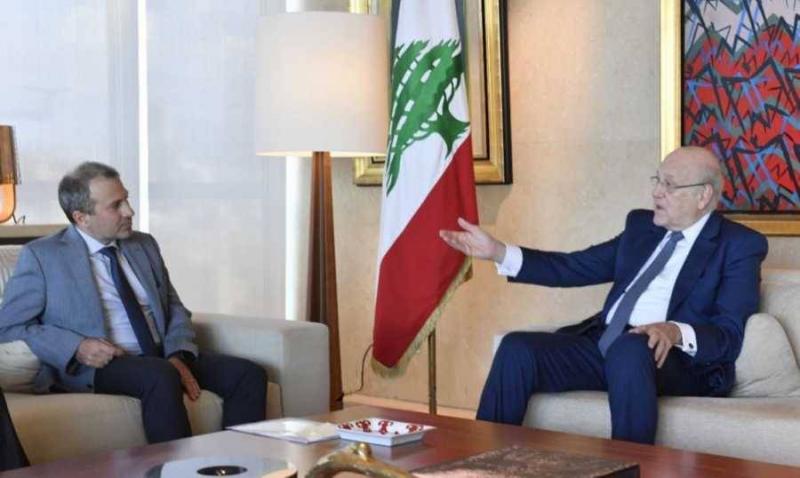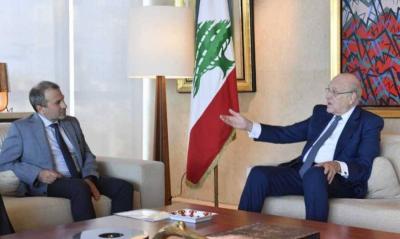With the countdown to the end of Lebanese President Michel Aoun's term underway and dwindling hopes for forming a new government before the end of October, political battles intensify between the "Free Patriotic Movement," led by Aoun's son-in-law, MP Gibran Bassil, and the caretaker Prime Minister and designated head of the new government, Najib Miqati. The exchanges and war of statements between them have reached an unprecedented level of accusations and counter-accusations regarding corruption and hindrances to government formation.
While the surface reasons for the campaign launched by the "Movement" appear to stem from discontent over the failure to form a government and placing the blame on Miqati—an issue explicitly stated by the "Free Patriotic Movement"—there are those who believe there are political motivations behind this clash. They relate to the imminent loss of the Movement's power, represented by the presidency, with Aoun's term ending, especially since entering a presidential vacuum phase would grant power to the government as stipulated by the constitution. This prospect presents a challenge for the "Free Patriotic Movement" within the context of its preemptive campaign. However, sources within the "Movement" deny this, asserting that anyone who secures 23 seats in parliamentary elections is politically strong and does not feel a sense of decline.
Former minister and former head of the northern lawyers' syndicate, Rashid Derbas, discusses the battle, recalling the campaigns that the "Movement" typically waged against previous prime ministers. He believes Miqati represents and confronts the interests of all those harmed by the Movement's prior campaigns, which explains the Sunni alignment with Miqati against this assault, revealing that a statement from former prime ministers is expected to be issued in the coming hours condemning these actions.
Derbas draws a direct connection between the unprecedented campaign by the "Movement" against Miqati and the impending end of President Michel Aoun's term, marking the end of the "Free Patriotic Movement" and Bassil's authority. He states, "It is impossible to separate what the 'Movement' is doing today from the anticipated presidential vacuum in Lebanon following Aoun's term in October, as the 'Movement,' which holds a parliamentary bloc mostly allied with it, derives its strength and authority from the position of the presidency, which will soon be lost. If a president is not elected immediately, the premier will emerge as the most powerful official in Lebanon, a position currently held by Najib Miqati as caretaker prime minister and the designated head of government." He reminds that according to the constitution, presidential powers transfer to the Council of Ministers if there is a vacancy, as stated in Article 62, which indicates that if the presidency is vacated for any reason, presidential powers are transferred to the Council of Ministers collectively.
Derbas elaborates, "In the event of a presidential vacuum, the prime minister will have a key role in addressing the impasse caused by the current presidency and the 'Free Patriotic Movement' regarding various issues, in addition to the presidential elections." He mentions that some people perceive Miqati as lacking popular representation or a parliamentary bloc, reminding that he chose not to run in the parliamentary elections and oversaw their conduct.
Pointing to the "Free Patriotic Movement's" practices against prime ministers since Aoun's presidency began, Derbas adds, "Who forgets their hatred against the late Prime Minister Rafik Hariri and what they termed the 'impossible acquittal' regarding former Prime Minister Fouad Siniora, and then accused former Prime Minister Tamam Salam of being 'Daesh-like'? They waited until former Prime Minister Saad Hariri met with President Barack Obama to declare their ministers' resignation from the government, all in the aim of humiliating the prime minister's position. This continues today with Miqati." He concludes, "They thrive only on campaigns of hatred."
Thus, Derbas believes Miqati today can claim to represent all those previously targeted by the "Free Patriotic Movement," including former Prime Minister Hassan Diab, who brought him to the premiership. He adds, "Miqati embodies all those harmed by the campaigns of the 'Free Patriotic Movement,' which is also evident in the Sunni support surrounding him against those who oppose him."
Conversely, leadership sources within the "Movement" reject linking presidential power to the campaign against Miqati, stating to Al-Sharq al-Awsat: "The 'Free Patriotic Movement' obtained 23 parliamentary seats in the elections with its allies, so anyone holding this bloc is politically strong. While it is natural for the presidential term to end, it does not make one feel a sense of decline." While these sources admit that the constitution grants presidential powers to the Council of Ministers collectively in case of a presidential vacancy, they maintain this does not apply to the caretaker government, saying, "First, why assume there will be a presidential vacancy when there is no justification for not electing a new president, and Parliament should play its role? Second, one who has lost power does not grant it; this government concluded its term before the president's term ended, and thus cannot assume presidential powers."
The sources return to place the responsibility for hindering government formation back on Miqati, insisting that he should consider the president's observations and submit a new cabinet proposal, affirming: "Neither President Aoun is in a position of pleading, nor is Miqati in a position of granting, as he does not hold the position. He must perform his constitutional duty to form the government as quickly as possible."




